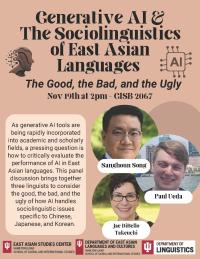November 10, 2025
DEALL Ph.D. Candidate, Paul Ueda, invited panelist on GenAI at Indiana University!

Wonderful news! Paul Ueda, our Ph.D. Candidate in Chinese Linguistics in DEALL, is an invited presenter at Indiana University in an upcoming panel on "Generative AI and the Sociolinguistics of East Asian Languages: The Good, the Bad, and the Ugly." Hosted by Indiana University's East Asian Studies Center, this is an in-person event that will take place in the Global & International Studies Building, Indiana University campus, on Wednesday, 19 November 2025 at 2:00-3:30 p.m. EST.
For the event, abstract and panelists, see details below. Congratulations, Paul!
Panel: "Generative AI and the Sociolinguistics of East Asian Languages: The Good, the Bad, and the Ugly"
Panelists: Sanghoun Song (Korea University), Paul Ueda (Ohio State University), and Jae DiBello Takeuchi (Indiana University)
Date: 19 November 2025
Place: Indiana University
Place: Indiana University
ABSTRACT
As generative AI tools are being rapidly incorporated into academic and scholarly fields, a pressing question is how to critically evaluate the performance of AI in East Asian languages. Because language is inherently embedded in social contexts, identities, and cultural norms, the Large Language Models (LLMs) upon which AI is based reflect a particular, and limited, set of sociocultural contexts. Therefore, sociolinguistic perspectives are essential for understanding how appropriately AI functions in East Asian languages and the cultural differences of East Asian societies underscore the need for a counterpoint to western-dominated AI models.
This panel discussion brings together three linguists to consider the good, the bad, and the ugly of how AI handles issues specific to Chinese, Japanese, and Korean. Drawing on sociolinguistic understandings of cultural and pragmatic usage, with special attention to linguistic variation in each language, the panelists detail applications and limitations of current AI tools for written and spoken input and output in East Asian languages. The discussion will begin with each panelist sharing their recent projects examining AI from a sociolinguistic standpoint. This will be followed by open discussion with attendees, who will be encouraged to consider ways to leverage AI for sociolinguistic research while acknowledging its inherent limitations.

The Panelists
Sanghoun Song is an associate professor of linguistics and the director of the Research Institute of Language and Information at Korea University. A computational linguist, his recent projects examine the intersection of sociolinguistics and AI.
Paul Ueda is a doctoral candidate at the Ohio State University in Chinese linguistics. A specialist in the sociolinguistics of orthography and Chinese variation, a recent project examines AI and Cantonese sociolinguistic variation.
Jae DiBello Takeuchi is an associate professor of Japanese and the Japanese Language Program Coordinator at Indiana University. Specializing in Japanese sociolinguistics and second language acquisition, she has recently been considering the possibilities of AI for Japanese language learning and examining how AI (mis)handles Japanese sociolinguistic variation.
